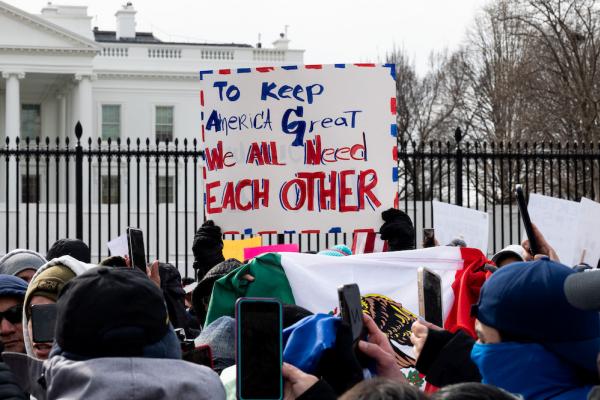For 35 years, our immigrant communities have worked for a pathway to citizenship for the now 11 million undocumented and under-documented immigrant people in the United States. In 2013, a diverse group of evangelical leaders and Christian groups — including the Southern Baptist Convention's Ethics & Religious Liberty Commission, the National Association of Evangelicals, and Sojourners — worked closely with a bipartisan congressional group to try to pass immigration reform through what became known as the Evangelical Immigration Table. But white evangelical support has since decreased: Today only 47 percent of white evangelicals say they support a pathway to citizenship, according to a 2021 study from the Public Religion Research Institute. This is down from 56 percent in 2013. The gap widens among those who attend religious services weekly or more, from 58 percent in 2013 to 45 percent in 2021. That change in support has real impacts.
In 2013, the Senate passed a bipartisan compromise to reform the U.S. immigration system, increasing border security and providing a pathway to citizenship for some undocumented immigrants. Unfortunately, the bill never made it to a vote in the House. Controversy erupted when thousands of children from Central America arrived at the U.S. southern border seeking asylum; political will in the House to pass reform eroded, and the bill expired without being passed. Nine years later, there has been a concerted effort to pass a pathway to citizenship through the federal budget process. But this time, not a single GOP senator has supported the effort, and even some moderate Democrats have stepped back from the bill.
But I still have hope for immigration reform. While white evangelical support has decreased, Black Protestant support for a pathway to citizenship increased from 70 percent in 2013 to 75 percent in 2021. Advocates are still working to pass a pathway to citizenship this spring. Immigration justice work is now widely recognized as anti-racism work — work to dismantle the systems of white supremacy that oppress us all. Our theology of the imago dei, of the image of God in every person, fuels both our voter protection advocacy and our work to create a pathway to citizenship for undocumented immigrant people. We are working to honor the God-given dignity and full personhood of every person by securing the legal right to vote and a legal status for undocumented immigrant people.
Faith communities have long honored the imago dei through both direct services for our immigrant communities and advocacy efforts to create a better immigration system — it’s important we remember that history. After President Ronald Reagan signed the Immigration Reform and Control Act of 1986, granting green cards and a pathway to citizenship to nearly 3 million undocumented immigrants, the faith community stepped up to help: Churches became certified processing centers, with members receiving training on how to help people adjust their immigrant status under the new law.
As we celebrate Black History Month, it is also important to remember the history of Black migrants. The Immigration Act of 1990 created the diversity visa, intended to increase immigration from countries the United States had historically restricted; over the past 30 years, these visas have enabled an increase in immigration from African and Asian nations. It also created a new type of relief from deportation, Temporary Protected Status (TPS), which allowed the president to offer protection to groups of people who could not safely return to their country. Religious groups once again stepped up to welcome West African migrants seeking asylum from political turmoil and violence in their home countries. Today, many religious groups continue to be involved in helping Black migrants from African countries like Cameroon and Sudan get TPS.
By contrast, the current position of white evangelicals seems to mimic some of the anti-biblical rhetoric of politicians. It’s no accident the group’s decline in support coincided with the candidacy and presidency of Donald Trump, who spewed anti-immigrant rhetoric and enacted white nationalist policies that targeted Black and brown immigrant people. There is a clear connection between the white nationalist pursuit of “keeping America great” and anti-immigration sentiment: Many politicians and white evangelical leaders who failed to oppose Trump’s racist words and policies are now failing to support immigration reform.
Our theology of loving our immigrant neighbors must be stronger than the structures of white supremacy. We need to look to the many Christians and people of faith in our immigrant communities, Black churches, and ally communities who cite their faith and relationships as their primary motivators to work to dismantle systems of oppression and white supremacy.
As people of faith, we serve a God that is a creator. God’s creative spirit is embedded in every part of our lives. It contributes to keeping our beloved communities thriving and growing. Without members of our beloved immigrant community, our nation would experience tremendous loss in jobs, community resources, and opportunities to connect with that creative spirit. Our work for a pathway to citizenship is more than an economic proposal — it is a way to ensure all the members of our beloved immigrant community are protected as citizens of this nation . So let us co-labor with our undocumented neighbors — who are made in the image of God — so we can all flourish and live abundant lives.
Got something to say about what you're reading? We value your feedback!






